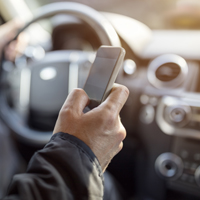Two-Thirds of Philly Drivers Use Their Phones in Cars
February 23, 2019 Despite knowing how dangerous it is to use mobile phones while driving, a recent survey shows that two-thirds of Philly drivers admit doing it when they should be focusing on the road. Researchers assert that smartphones – and their apps for music, navigation, and so much more – have made it even more difficult for drivers to resist the urge for fiddling with their phones behind the wheel. Distracted driving accounts for almost 25% of all car accidents. By being informed and accountable, we can all do our part to limit preventable injuries and deaths.
Despite knowing how dangerous it is to use mobile phones while driving, a recent survey shows that two-thirds of Philly drivers admit doing it when they should be focusing on the road. Researchers assert that smartphones – and their apps for music, navigation, and so much more – have made it even more difficult for drivers to resist the urge for fiddling with their phones behind the wheel. Distracted driving accounts for almost 25% of all car accidents. By being informed and accountable, we can all do our part to limit preventable injuries and deaths.
Distracted Driving Data
According to the National Safety Council (NSC), more than 90% of all motor vehicle accidents result from human error. One particularly lethal form of human error is when a driver is distracted; luckily, distracted driving scenarios are preventable by driving safely and responsibly. There are three different types of primary driver distraction. They are:
- Manual distraction: Manual distraction occurs when a person physically takes one or both hands off the wheel. Examples of manual distraction include changing a radio station or navigation setting, reaching for an object (e.g. sunglasses or wallet), drinking, or eating;
- Visual distraction: A driver who takes his or her eyes off the road is visually distracted, no matter the reason for looking away. And, lastly:
- Cognitive distraction: A person is cognitively distracted when he or she thinks about something other than the task at hand: driving. No matter whether or not a person is daydreaming, speaking on the phone, or stressed and/or upset, these are all known – and dangerous – forms of cognitive distractions. The only thing to pay attention to while driving is being aware of your surroundings and others on the road.
According to the National Highway Traffic Safety Administration (NHTSA), 3,450 people were killed in distracted driving-related crashes in 2016 – and more than 390,000 others were injured that same calendar year.
The Survey’s Results
People fall prey to the temptation of using their phones behind the wheel for a variety of reasons. For some, they think that it is no big deal to type in a new address on their GPS, or to zone out while dancing along to an old song. The survey on Philly-area drivers found that the most common reasons cited for people using cell phones while driving were:
- Worrying about missing out on information;
- Trying to “pass” time behind the wheel, and/or:
- Keeping in touch with family members
The truth is, data consistently shows that these behaviors are more likely to result in crashes than when a driver is NOT distracted behind the wheel. No matter what the reason or excuse, it is wrong to behave in ways that result in distracted driving. Too often people forget that momentary decisions – like glancing down at a cell phone – can culminate into a tragic, life or death situation for not only themselves, but also everyone on the road.
The survey showed that individuals in certain age groups were more likely to use mobile devices to navigate, text, email, take photos, or record videos while driving than other age groups. In general, millennials – or people who reached their adulthood early in the 2000s – reported the highest rates of mobile device use while driving. Older individuals also reported cell phone use at alarmingly high rates. Talking on the phone while driving was the most common form of driver distraction for individuals of all ages, with using mobile devices for mapping or navigation came in a close second.
How to Stay Safe Behind the Wheel!
Many people believe that hands-free technology – also known as “infotainment” dashboards – is safe and limits distractions. But hands-free technology, just like smartphones and anything else that takes a person’s attention away from driving, can all be deadly. For this reason, and so many others, we should all commit to not becoming distracted behind the wheel. Here are some tips for avoiding distracted driving from the American Automobile Association (AAA):
- Eat before getting in the vehicle or before turning the car on;
- If you start getting tired, pull over immediately or stop somewhere safe;
- ONLY use a cell phone if there is an emergency;
- Adjust items, like your mirrors or seats, before beginning to drive, and:
- If something is diverting your attention – even worrying about a friend or family member – pull over and take a break.
If you would like to read more safety tips on limiting distracted driving, please visit here. If you have questions or were injured by a distracted driver and would like to learn about how to file a legal claim, please contact a representative at our firm directly.
Philadelphia Car Accident Lawyers at Galfand Berger, LLP Representing Injured Individuals Since 1947
If you were injured in a car accident, please contact our Philadelphia car accident lawyers at Galfand Berger. With offices located in Philadelphia, Bethlehem, Lancaster, and Reading we serve clients throughout Pennsylvania and New Jersey. To schedule a consultation, call us at 800-222-8792 or complete our online contact form.
 Google Screened
Google Screened
